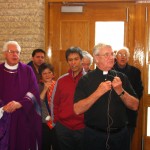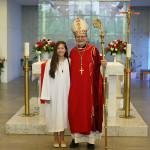Today is the World Day of Prayer for vocations. We often hear of or read about the vocational crisis. There is a great shortage of priests, especially in Northern Europe and here in North America. Years ago Toronto would have as many as 40 priests being ordained. This year Cardinal Collins will ordain 4 men.
It is the same for religious communities. Our Passionist Communities in the States haven’t had an ordination in the past five years. Luckily we belong to an international community and so we are able to call on other Passionist communities for help to sustain the different ministries in which we are involved. The Passionists in the Philippines and in Kenya were willing to share their wealth with us by sending us Brando and John. After a lot of vetting Cardinal Collins invites priests from other dioceses to come and minister here.
There is a shortage of ordained priests that is world-wide but there is not a shortage of priests. All of you good people are priests because you are baptized. St. Peter wrote that because of our baptism we are all a chosen race, a royal priesthood called to offer spiritual sacrifices acceptable to God. This is called the priesthood of all the faithful, the priesthood of all believers.
You good people exercise your priesthood in so many different ways. For example a priest blesses people. Every time you show respect to another person, regardless of their sex, religion, racial origin or lifestyle you are blessing that person. A priest celebrates Mass; in thanksgiving he offers the body and blood of Christ at the altar. When your offer to God your prayers, works and sufferings of the day you are doing a priestly act. A priest preaches. When you try to live the teachings of Jesus in the way you relate to family members and friends you are doing a priestly work. A priest absolves sins in the sacrament of reconciliation. When you make peace, apologize to a person you’ve hurt and when you make up with someone who has hurt you in anyway, you are doing a priestly thing. A priest anoints the sick. When you are present to someone who is ill, house bound and lonely, you are a priest to that person. If you have a family member or a friend who is alienated from the Church for whatever reason or who live their lives as if God did not exist and you stick with that person, pray for that person and hope that by living your own religious conviction you may bring them back to God, you are doing a priestly thing. To be touched, loved, supported or forgiven by you, priest that you are, is to be touched, loved, supported and forgiven by Christ.
Can we think on this? If the members of the priesthood of all believers were living their priesthood as I’ve described it, might there be more men willing to take on the work of the ordained priesthood?
Today’s gospel is all about Jesus the Good Shepherd. Jesus calls himself a shepherd but he also calls the gatekeeper. I read a description of the Middle Eastern sheepherding practices that tie these two images together.
The sheepfold was a circular wall of stones, topped by barriers of briars and thorns.There was a small opening for the sheep to pass through. Once all the sheep were in, instead of closing a hinged gate the gatekeeper, who was probably one of the shepherds would lie across the entrance and sleep. No one could get in or out without going over his body. Christ the good shepherd laid down his life his sheep as a gatekeeper and as the one who died on the cross. So we pray on this good shepherd Sunday that Christ the Good Shepherd bless the church with shepherds after his own heart?
Pray for vocations.
 Founded by St. Paul of the Cross, every Passionist takes a special vow to spend his or her energies in promoting remembrance of the sufferings of Jesus, the memory of the Cross, and reflection of the meaning of the Cross for the world.
Founded by St. Paul of the Cross, every Passionist takes a special vow to spend his or her energies in promoting remembrance of the sufferings of Jesus, the memory of the Cross, and reflection of the meaning of the Cross for the world.




